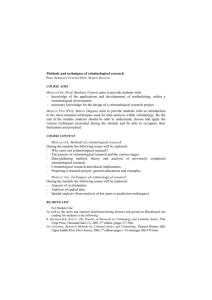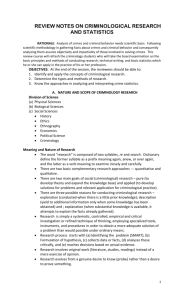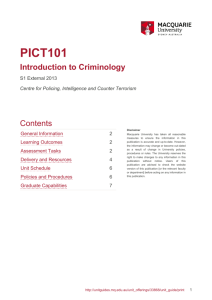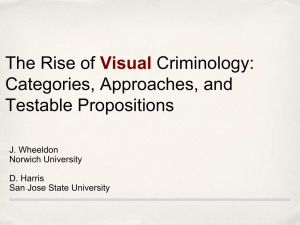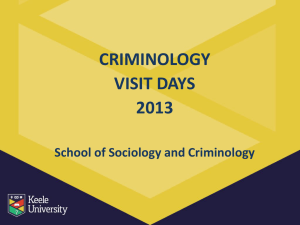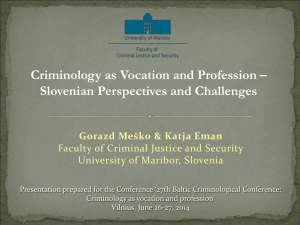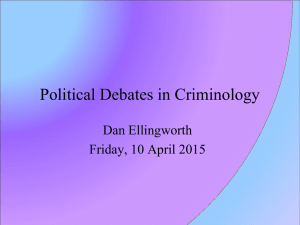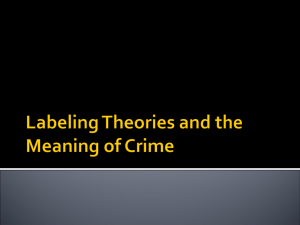Criminologists* Values and Horizons of Criminology
advertisement
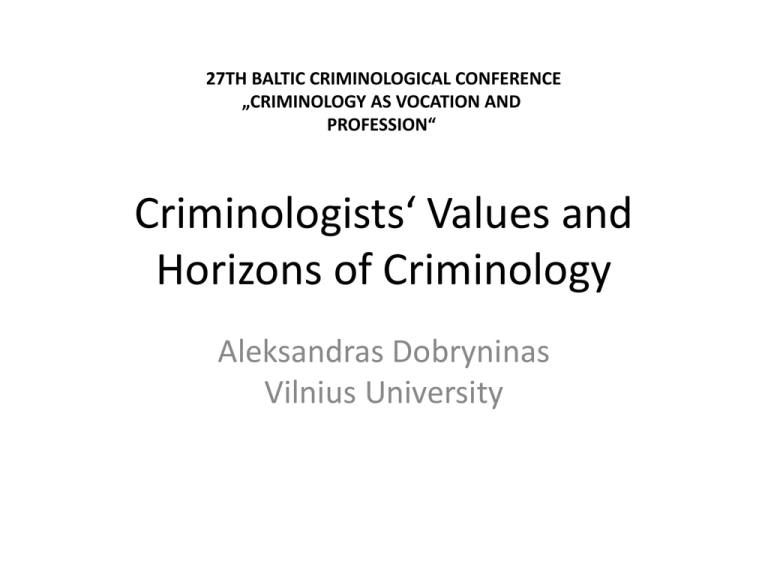
27TH BALTIC CRIMINOLOGICAL CONFERENCE „CRIMINOLOGY AS VOCATION AND PROFESSION“ Criminologists‘ Values and Horizons of Criminology Aleksandras Dobryninas Vilnius University Foundation of Criminology: Philosophical and Logical Aspects (1990) Foundation of Criminology: the Book‘s Content Chapter 1. Past and present of criminological theory 1.1. Two paradigms of criminological theory 1.2. Current stance of criminological theory 1.3. Paradoxes of criminological theory. Chapter 2. Logical and linguistic analysis of criminological concepts 2.1 Scientific criteria in criminology 2.2. Sense and meaning of the terms of the criminological research 2.3. Logical and linguistic analysis of criminological paradoxes Chapter 3. Criminological personalization 3.1. Explanation and understanding in criminology 3.2. Criminological framing 3.2. Criminological text Chapter 4. Criminological institualization 4.1. Horizon of criminological investigations 4.2. Legislation and the implementation of law 4.3. Criminological values Towards Hermeneutical Criminology • „For criminology it is important to understand criminological paradigms, to scrutinize their theoretical, institutional, and cultural sources. Such understanding is needed, if criminologist wants not only to grasp plain criminological theoretical constructions, but also - to penetrate into their background: live human world, were criminologist finds himself as a moral subject and as a producer of the criminological world“ (JB&AD, p. 207) Prospect for revision: three Add-Ons • 1st add-on: cultural vision of criminal justice: Source: Hulsman L. (1991). “The Abolitionist Case: Alternative Crime Policies”, Israel Law Review, vol. 25, p. 684. • 2nd add-on: constructionist methodological perspective: Formulation of definitions of crime Application of definitions of crime Class strugle and class conflict Construction of the idelology of crime Development of behavior patterns in relation to definition of crime The Social Reality of Crime (Quinney, 1970) • 3rd add-on: socio-epistemic discourses: – Discourse as empowered usage of language in epistemically segmented society (A Schutz, M Foucault, P Bourdieu) – Three types of criminal justice discourses: • Experts – criminologists, law professionals, officers of law enforcement institutions – discourse on “true” justice. • Well-informed citizen – politicians, decision-makers, journalists, etc. – discourse on criminal justice in the context of societal interests (inter-esse). • People from the street – ordinary people with common sense approach to crime and punishment Example of Research Application • Research on Reception of Criminal Justice in Society (the research is funded by the European Social Fund under the Global Grant measure (VP1-3.1-ŠMM-07-K01-049); 2011-2014. • Goals: - Analysis of the reception of criminal justice in society. • Methodology: – Constructionist approach with elements of discourse analysis • Team: – Interdisciplinary team consists of psychologist, sociologist, criminologist, economist, and lawyer. Back to Punishment: Biblical sources • Vengeance is mine, and recompense, for the time when their foot shall slip; for the day of their calamity is at hand, and their doom comes swiftly. (Deuteronomy 32:35) • Do not take revenge, my dear friends, but leave room for God's wrath, for it is written: "It is mine to avenge; I will repay," says the Lord (Romans 12:19) PP • “Criminology is a boring subject, but its questions…” (N. Christie)
